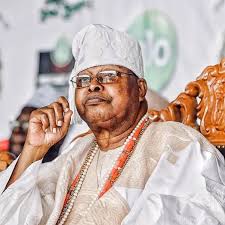A Dual National Tragedy
The passing of Ọba Sikiru Kayọde Adetona, the Awujale of Ijebuland, on July 13, 2025, at age 91, reverberated across Nigeria as a profound cultural and historical loss. His death occurred mere hours after the announcement of former President Muhammadu Buhari’s demise—a close friend and political ally—plunging the nation into what Ogun State Governor Dapo Abiodun termed “double sadness.” As the longest-reigning Yoruba monarch, Adetona’s 65-year rule (1960–2025) symbolized stability, modernity, and cultural pride for the Ijebu people and beyond. His final weeks hinted at fragility; he missed the June 2025 Ojude Oba Festival while recuperating from hospitalization, foreshadowing the silence now enveloping his palace.
The Final Hours: Context of the Awujale’s Passing
Chronology of Events
At 91, Adetona took his last breath on July 13, 2025—confirmed by Governor Abiodun’s official announcement. His death followed Buhari’s by hours, the former president having died in a London clinic after a prolonged illness. This synchronicity felt poetic: Buhari’s 1983 coup had once saved Adetona from deposition, cementing a four-decade bond of loyalty. Rumors of the Awujale’s death had swirled before—notably in 2021—prompting fierce palace denials. Adetona himself laughed these off as “mischievous,” embodying the resilience that defined his reign.
Immediate Reactions
Governor Abiodun hailed Adetona as the architect who transformed Ijebuland into a “hub of commerce and tradition.” President Bola Tinubu mourned a “towering natural ruler” whose counsel bridged political divides. Streets emptied in Ijebu-Ode as news spread; markets shuttered, and residents gathered at the palace gates, weeping openly. Social media flooded with #DoubleLoss, underscoring the emotional weight of losing two national icons in one day.
A Reign Unparalleled: 65 Years of Transformative Leadership
| Year | Event | Significance |
|---|---|---|
| 1960 | Coronation (April 2) | Became 50th Awujale at 26 |
| 1960 | Joined Western House of Chiefs | Advocated for regional infrastructure |
| 1983 | Survived deposition attempt | Buhari’s coup voided removal order |
| 2024 | Awarded GCON by Tinubu | Nigeria’s second-highest national honour |
| 2025 | Final public appearance | Marked 65th coronation anniversary |
Pillars of His Legacy
Adetona elevated the Ojude Oba festival from a local gathering to a global spectacle, drawing diasporans and tourists. He modernized rituals while preserving ancestral Yoruba practices, like the Ita Oba royal procession. He pioneered Ijebu’s first tertiary institution (Olabisi Onabanjo University) and funded hospitals, insisting healthcare was “non-negotiable.” His advocacy pressured governments to upgrade the Sagamu-Benin expressway, boosting regional trade. From mediating the 1993 electoral crisis to advising Presidents Jonathan and Buhari, he wielded soft power deftly. “He spoke truth to power without raising his voice,” a former minister noted.
Roots of Royalty: Early Life and Path to the Throne
Ancestry and Education
Born May 10, 1934, in Imupa, Ijebu-Ode, Adetona descended from the House of Anikinaiya, tracing lineage to Ọbanta—founder of the Ijebu Kingdom. His father, Prince Rufai Adetọna, was a grandson of Ọba Adeleke, Awujalẹ from 1895–1906, embedding governance in his DNA. At Baptist schools and Olu-Iwa College, young Sikiru excelled in mathematics. He later audited courses in the UK, though his accounting studies were cut short by destiny’s call.
Unconventional Ascension
In 1960, kingmakers stunned traditionalists by choosing 26-year-old Sikiru over older rivals. As one historian noted, “They saw his charisma—a modernizer who revered tradition.” For three months, he endured Odo seclusion—fasting, learning secret chants, and bonding with ancestors. Emerging on April 2, 1960, he pledged to “serve, not rule.”
Beyond the Throne: Personal Life and National Symbolism
Humanizing the Monarch
Married to queens Iyabọ Oke, Modupe Ẹkundayọ, and Oluwakẹmi Dodo-Williams, he fathered nine children, insisting they attend public schools “to understand real life.” His brother Supo’s 2014 death left him the family’s sole patriarch. Despite his status, he banned pompous titles. “Call me Kabiyesi (Your Majesty), but don’t grovel,” he chided. His humor disarmed critics; when a diplomat overpraised him, he retorted, “Save flattery for my funeral!”
The Buhari Bond: A Friendship Forged in Crisis
Governor Onabanjo’s deposition order against Adetona—set for January 2, 1984—was shredded when Buhari’s December 31 coup toppled the civilian regime. The Awujale later called it “divine intervention.” Buhari consulted Adetona before major decisions, including his 2015 presidential run. Their bond, Adetona quipped, was “like palm wine and kolanut—unlikely but quintessentially Nigerian.”
Cultural Resonance: What His Death Means for Nigeria
Gaps Left Behind
In a nation fractured by ethnicity and religion, Adetona was a reconciler. He hosted Christian-Muslim dialogues during riots and funded scholarships for indigent Northern students. He championed girls’ education while expanding the Agemo priestly system, proving “tradition and progress can dance together.”
Succession Dynamics
Per Ijebu custom, the next Awujale will rotate among four lineages: Gbelegbuwa, Anikinaiya, Fusengbuwa, and Fidipote. Successors must uphold his dual legacy—fostering tech hubs without eroding the Osugbo sacred groves. As scholar Fẹmi Kẹhinde warned, “You cannot automate wisdom.”
Immortality Through Legacy
Awujale Adetona’s death at 91 closes Nigeria’s longest royal reign, but his impact endures. He reshaped Ijebuland into a beacon of cultural resilience and progress, proving tradition could thrive alongside modernity. As Ijebu mourns, his Ojude Oba festivals, educational endowments, and diplomatic wisdom cement his immortality. In Governor Abiodun’s words: “His soul rests, but his values light our path forward.”


